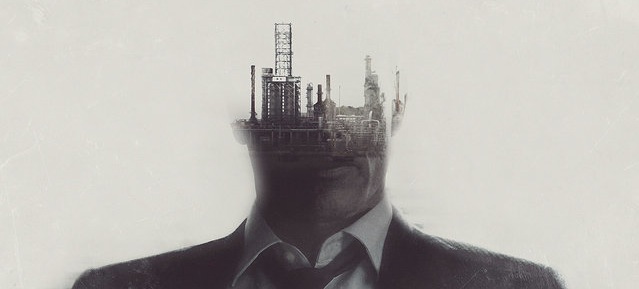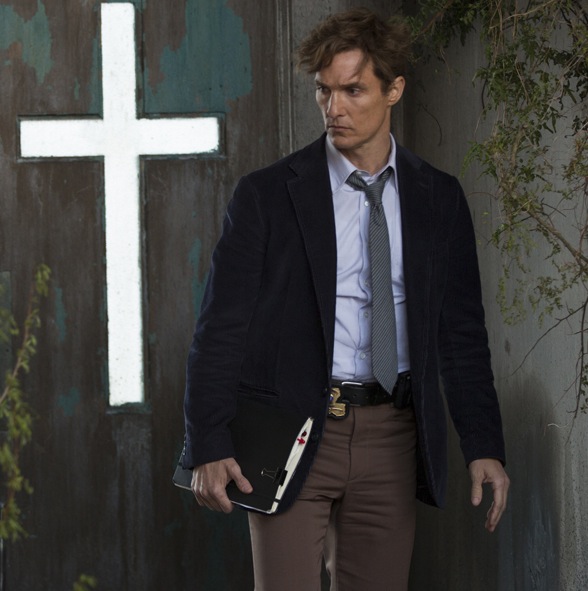
 Raise your hand if you’re currently obsessed with HBO’s True Detective. Okay, hands down – you’re all suspects. I’ve been telling myself to hold off on writing about the series until it finishes, that it’s far too elegant to take apart before we have all the pieces. And it is. HBO has given us an exquisitely crafted drama, as gripping as it is rigorous, something that not only invites but rewards reflection and, yes, investigation (in one of the show’s many meta-gestures, writer/creator Nic Pizzolatto is making detectives of us all). It’s also a show that is clearly much smarter than we are, indeed, a big part of its rush has to do with the narrative and philosophical vertigo it gives the viewer. Every time we think we have an inkling of what’s going on, the writers give us a can’t-look-away glimpse of some sinister new chasm of possibility. (They’re not exactly shy about posing theological questions/doubts, either). The grim tone may be somewhat reminiscent of The Wire, but the escalation and underlying horror make Twin Peaks the more natural touchstone–minus the whimsy, of course. Truth be told, though, True Detective is forging its own path quite boldly, one that involves an unprecedented integration of intellect and intrigue. The confidence thus far is breathtaking.
Raise your hand if you’re currently obsessed with HBO’s True Detective. Okay, hands down – you’re all suspects. I’ve been telling myself to hold off on writing about the series until it finishes, that it’s far too elegant to take apart before we have all the pieces. And it is. HBO has given us an exquisitely crafted drama, as gripping as it is rigorous, something that not only invites but rewards reflection and, yes, investigation (in one of the show’s many meta-gestures, writer/creator Nic Pizzolatto is making detectives of us all). It’s also a show that is clearly much smarter than we are, indeed, a big part of its rush has to do with the narrative and philosophical vertigo it gives the viewer. Every time we think we have an inkling of what’s going on, the writers give us a can’t-look-away glimpse of some sinister new chasm of possibility. (They’re not exactly shy about posing theological questions/doubts, either). The grim tone may be somewhat reminiscent of The Wire, but the escalation and underlying horror make Twin Peaks the more natural touchstone–minus the whimsy, of course. Truth be told, though, True Detective is forging its own path quite boldly, one that involves an unprecedented integration of intellect and intrigue. The confidence thus far is breathtaking.
There’s not much more we can safely say about True Detective yet, other than that we are witnessing something consummate and monumentally spooky. Spooky not just in terms of plot and atmosphere and existentialism, but in the subtle way it implicates the audience, both our relationship to the story it is telling and storytelling itself. “We are things that labor under the illusion of having a self” is how, um, self-described pessimist and the true detective himself, Rust Cohle (played by Mr. Unexpected Genius himself, Matthew McConaughey), characterizes human nature in the first episode, and if we know anything about the “self”, it’s how much it enjoys co-opting whatever narrative it can find to explain/justify/project itself (especially as the protagonist). Rust appears to have come up against a story he can’t puzzle out, one that goes beyond his rock-bottom anthropology, that contains shades of, well, evil. Which is perhaps why it is consuming him. If some stories claim to have redemptive potential, then perhaps others have the opposite capability (as the illusions to Robert Chambers’ The King in Yellow seem to imply).
http://www.youtube.com/watch?v=A_bqmFc–0E&w=600
He’s not alone. A few episodes later, when asked about his uncanny interrogation abilities, Cohle responds that when he looks at a person, he can see “their hunger and their haunt” written on their face. Unable to turn away from the action myself, I couldn’t help but feel a little exposed. After all, stories are more than just explanations. We use them for both distraction and consolation, a means of imposing order where there may not be any, thereby avoiding honest confrontation with reality and/or the void. Of course, a truly masterful story has the power, under the guise of escape, to get us in touch with who we really are (and what we really need). Cohle puts our predicament in surprisingly moral terms:
“Look – everybody knows there’s something wrong with them. They just don’t know what it is. Everybody wants confession, everybody wants some cathartic narrative for it. The guilty especially. And everybody’s guilty.”
Perhaps Pizzolatto is taking Cohle’s pessimism to its logical conclusion–in which case we have a show that lets no one off the hook (and the only thing more frightening than TD‘s story is what our fascination with that story says about us). Or perhaps it is hinting at some deeper morality or meaning. I mean, despite his protestations, something is clearly keeping the man going. It might not necessarily be hope-shaped, but there is something vaguely promising about his quest. And yet I doubt Pizzolatto and director Cary Fukunaga want us to view Cohle exclusively as prophet. His illusions may be more complicated than those of his partner Marty’s, but he clearly hasn’t survived unscathed. Pizzolatto put it this way to The Daily Beast:
“You could see Cohle as Job crying out to an unhearing God,” he explained. “Or you could see him as something else.”
“Like what?” I asked.
“Cohle describes the possibility of other dimensions existing, and he says that’s what eternity is,” Pizzolatto continued. “He says that if somehow you existed outside of time, you’d be able to see the whole of our dimension as one superstructure with matter superimposed at every position it had ever occupied. He says that the nature of the universe is your consciousness, and it just keeps cycling along the same point in that superstructure: when you die, you’re reborn into yourself again, and you just keep living the same life over and over. He also explains that from a higher mathematical vantage point, our dimension would seem less dimensional. It would look flattened, almost.”
Pizzolatto took a bite of his branzino. “Now, think about all the things Cohle is talking about,” he said as he finished chewing. “Is [Cohle] a man railing against an uncaring god? Or is he a character in a TV show railing against his audience? Aren’t we the creatures of that higher dimension? The creatures who can see the totality of his world? After all, we get to see all eight episodes of his life. On a flat screen.”
So is True Detective the next glorious step in the golden age of television, where shows deconstruct and reconstruct themselves simultaneously? Is it a metaphysical comment on the hellishness of reincarnation and recidivism? Or is it just an amazingly well-paced mini-series with unbelievable production values? Does it even matter? Whatever Pizzolatto and co are doing, I just hope they keep doing it. Sure, it’d be nice to get some kind of resolution (preferably one doesn’t resemble Fletch Lives too closely), but I’m not, er, optimistic.
http://www.youtube.com/watch?v=K1ztQMr7VqA&w=600
http://www.youtube.com/watch?v=3MbPKOWSQhc&w=600

COMMENTS
5 responses to “Everybody’s Guilty on True Detective”
Leave a Reply













I am calling it, DZ, McConaughey will win an Oscar in the next four years. The man is making stunning film/TV choices and this is, by far, his best to date. His countenance and tone and words literally cause me to shiver.
Glad you are obsessed with this as well…and that I am not the only one! I mean YOU KNEW I would be watching this show, because I am jacked up in the head :). Look forward to reading your thoughts once the season has ended…
I wonder if Kohle himself wants to confess? And for what? What is the eventual end point of his pessimism? It will be fascinating to see what Pizzolatto does with him.
I’m normally lock step with you guys on detective shows (“Sherlock”, “Luther”) and more contemplative fare like “Rectify”.
However, I’ve found it a bit of a chore to slog through these first five episodes of “True Detective”.
I like the Martin Hart storyline and the show sizzles when Hart and Kohle are on screen together, but Kohle’s pontifications in the deposition room get a bit mind numbing to me. His intelligence is fascinating but I find his arrogant tone off-putting….just struggling to like the guy.
McConauhey is great in the role, but the character is a hard watch.
Ever since I saw the quick post in an “Another Week Ends” post I’ve been waiting for an entry. Thank you!
I’ve already used one quote from this show in one sermon. The quote on guilt might just creep its way into my Ash Wednesday sermon.
This latest episode last night was great again. I don’t know if anyone is going to do another blog entry, but it really brings the show back down to Earth in some ways. Episode 5 ended in such a way as to spur on millions of hypothesizers to try to answer the questions of ‘Who the Yellow King is’ and ‘What the show REALLY is about.’ The amount of internet speculation almost reached ‘Lost’-ish levels.
Episode 6 reminds us that this show is not in its essence about whodunnit or the meta-media or meta-narrative references. True Detective is about two fleshed out, well-acted, yin-and-yang characters, Marty Hart and Rust Cohle. Their obsessions, their strengths and weaknesses, their relationship.